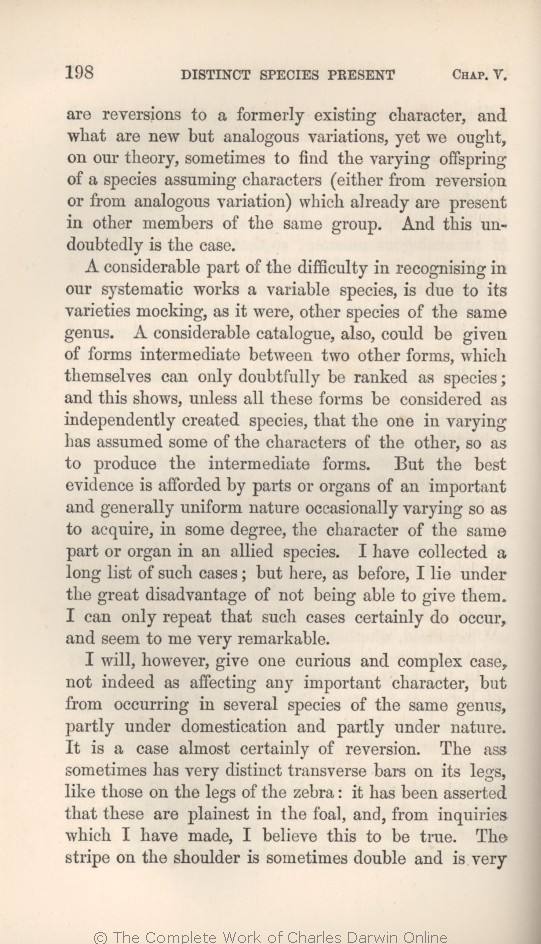are reversions to
a formerly | a formerly 1866 1869 | | an anciently 1859 1860 1861 | | formerly 1872 |
| character, 1859 1860 1861 1866 1869 | | characters, 1872 |
| our 1869 1872 | | my 1859 1860 1861 1866 |
| (either from reversion or from analogous variation) which already are present in 1869 |
| (either from reversion or from analogous variation) which already occur in some 1859 1860 1861 1866 |
| which are already present in 1872 |
| case. 1869 1872 | | case 1859 1860 1861 1866 |
| ..... 1869 1872 | | in 1859 1860 1861 1866 |
| ..... 1869 1872 | | nature. 1859 1860 1861 1866 |
|
|
A considerable part of the | A considerable part of the 1859 1860 1861 1866 1869 |
| The 1872 |
| recognising in our systematic works a variable species, is 1866 1869 |
| recognising a variable species in our systematic works, is 1859 1860 1861 |
| distinguishing variable species is largely 1872 |
| its 1859 1860 1861 1866 1869 | | the 1872 |
| OMIT 1869 1872 |
| some of the 1859 1860 1861 1866 |
| can only doubtfully be 1869 1872 |
| must be doubtfully 1859 1860 1861 1866 |
| OMIT 1869 1872 |
| either varieties or 1859 1860 1861 1866 |
| forms 1859 1860 1861 1866 1869 |
| closely allied forms 1872 |
| the 1859 1860 1861 1866 1869 | | they 1872 |
| one 1859 1860 1861 1866 1869 | | have 1872 |
| has 1859 1860 1861 1866 1869 | has 1872 |
| other, 1859 1860 1861 1866 1869 | | others. 1872 |
| so 1859 1860 1861 1866 1869 | so 1872 |
| as 1859 1860 1861 1866 1869 | as 1872 |
| to 1859 1860 1861 1866 1869 | to 1872 |
| produce 1859 1860 1861 1866 1869 | produce 1872 |
| the 1859 1860 1861 1866 1869 | the 1872 |
| intermediate 1859 1860 1861 1866 1869 | intermediate 1872 |
| forms. 1869 | | form. 1859 1860 1861 1866 | forms. 1872 |
| is 1859 1860 1861 1866 1869 |
| of analogous variations is 1872 |
| of an important and generally uniform nature occasionally varying 1869 |
| of an important and uniform nature occasionally varying 1859 1860 1861 1866 |
| which are generally constant in character, but which occasionally vary 1872 |
| acquire, 1859 1860 1861 1866 1869 | | resemble, 1872 |
| character of the 1859 1860 1861 1866 1869 |
| OMIT 1872 |
| the 1869 1872 | | a 1859 1860 1861 1866 |
| of 1869 1872 | | in 1859 1860 1861 1866 |
| do 1859 1860 1861 1866 1869 | do 1872 |
|
|
I will, however, give one curious and complex case, not indeed as affecting any important character, but from occurring in several species of the same genus, partly under domestication and partly under nature. It is a case
almost certainly | almost certainly 1866 1869 1872 | | apparently 1859 1860 1861 |
| sometimes 1866 1869 1872 | | not rarely 1859 1860 1861 |
| the 1860 1861 1866 1869 1872 | | a 1859 |
| zebra: 1859 1860 1861 1866 1869 | | zebra. 1872 |
| it 1859 1860 1861 1869 | it 1866 1872 |
| has 1859 1860 1861 1869 | has 1866 1872 |
| been 1859 1860 1861 1869 | been 1866 1872 |
| asserted 1859 1860 1861 1869 | asserted 1866 1872 |
| that 1859 1860 1861 1869 | that 1866 1872 |
| these 1859 1860 1861 1869 | these 1866 1872 |
| are 1859 1860 1861 1869 | are 1866 1872 |
| plainest 1859 1860 1861 1869 | plainest 1866 1872 |
| in 1859 1860 1861 1869 | in 1866 1872 |
| the 1859 1860 1861 1869 | the 1866 1872 |
| foal, 1859 1860 1861 1869 | foal, 1866 1872 |
| and, 1869 | | and 1859 1860 1861 | and, 1866 1872 |
| from 1859 1860 1861 1869 | from 1866 1872 |
| inquiries 1859 1860 1861 1869 | inquiries 1866 1872 |
| which 1859 1860 1861 1869 | which 1866 1872 |
| I 1859 1860 1861 1869 | I 1866 1872 |
| have 1859 1860 1861 1869 | have 1866 1872 |
| made, 1859 1860 1861 1869 | made, 1866 1872 |
| I 1859 1860 1861 1869 | I 1866 1872 |
| believe 1859 1860 1861 1869 | believe 1866 1872 |
| this 1859 1860 1861 1869 | this 1866 1872 |
| to 1859 1860 1861 1869 | to 1866 1872 |
| be 1859 1860 1861 1869 | be 1866 1872 |
| true. 1859 1860 1861 1869 | true. 1866 1872 |
| 1 blocks not present in 1869; present in 1859 1860 1861 1866 1872 | | It
has also
been asserted that the stripe on each shoulder is sometimes double.
|
| stripe on the shoulder is sometimes double and is 1866 1869 |
| shoulder-stripe is certainly 1859 1860 1861 |
| stripe on the shoulder is sometimes double, and is 1872 |
|









